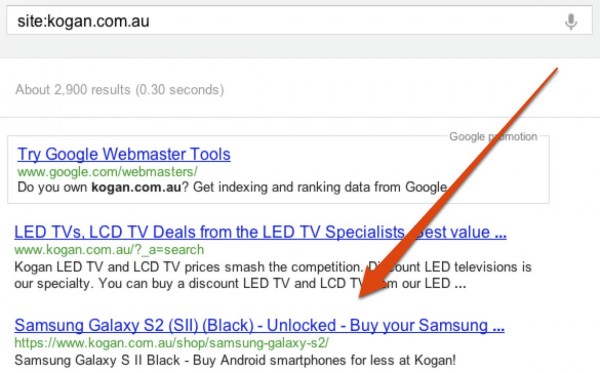No, Microsoft Didn’t “Disappear” Kogan From Bing Over The “IE7 Tax”
Shopping site Kogan imposes an “Internet Explorer 7” tax. Kogan then mysteriously disappears from Microsoft’s Bing search engine. Revenge? No, just a technical goof, says Microsoft, one that it is correcting. Kogan grabbed headlines last month when it began adding an additional 6.8% charge to purchases for those using Internet Explorer 7. Calling it the “Internet […]

Kogan grabbed headlines last month when it began adding an additional 6.8% charge to purchases for those using Internet Explorer 7. Calling it the “Internet Explorer 7” tax, the fee was designed to encourage people to upgrade.
This week, Kogan was blogging again about Microsoft, this time to say that its Kogan.com site was dropped from Microsoft’s Bing search engine. That’s still the case today:
Was it some type of retribution, the Kogan wondered:
We hope Microsoft were not too offended by what we did with the IE7 tax and this is just a temporary glitch.
It certainly would have made no sense for Microsoft to be upset. This is the company that ran its own site to get people off Internet Explorer 6. It’s actively pushing IE 9 these days, so being upset about people suggesting that IE 7 be left behind doesn’t make much sense.
It’s Technical
What makes much more sense is some type of technical problem. My first guess was that Kogan itself might have been blocking Bing accidentally, perhaps through a mistake in its robots.txt file. That file is a way that publishers can block search engines from crawling their sites.
Kogan does have a problem with its robots.txt file, where it’s not being fed out as an actual text document. People at Hacker News already had noted this. Still, that glitch wasn’t causing problems for Google, so was it really an issue with Bing? After some investigation yesterday, Bing got back to me today with the technical culprit.
Microsoft says the Kogan.com domain was parked for a couple of years and had been removed from Bing, as Bing typically doesn’t list parked domains. At some point, Kogan apparently began using the domain again, redirecting traffic from its existing Australian (kogan.com.au) site. Microsoft didn’t detect that the domain was no longer parked, so the pages it was pointing at began to be removed, deemed to be inactive.
Now that Microsoft realizes its error, it has changed the parked status and says the site should begin showing up again in the next few days. Microsoft said it is also evaluating things to prevent this from happening to other sites in the future on Bing.
It’s Not Just A Bing Thing
FYI, Google doesn’t like parked domains that much, either. It’s also had technical glitches with them, as recently as last April. And while Google might list pages from Kogan.com, it also still lists some of those pages under their old locations at the kogan.com.au address. Should you click on one of those links like this:
For me, Google’s Chrome browser fires up a big, scary warning like this:
That’s happening because of a misconfiguration on Kogan’s site.
My guess is that shortly after creating its Internet Explorer 7 tax, Kogan made some domain changes that are creating these types of problems, which even happen with Blekko:

Bottom line: technical glitch on Bing’s part, but Kogan itself probably has some issues to clean up on its end.
Opinions expressed in this article are those of the guest author and not necessarily Search Engine Land. Staff authors are listed here.
Related stories


